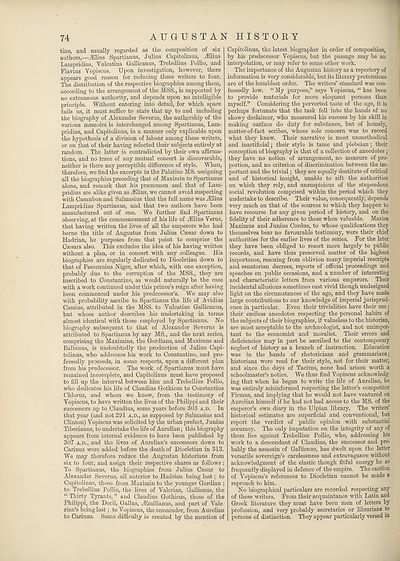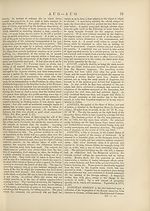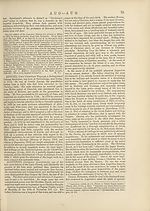Encyclopaedia Britannica > Volume 3, Athens-BOI
(86) Page 74
Download files
Complete book:
Individual page:
Thumbnail gallery: Grid view | List view

74 AUGUSTANHISTORY
tine, and usually regarded as the composition of six
authors,—iElius Spartianus, Julius Capitolinus, iElius
Lanipridius, Vulcatius Gallicanus, Trebellius Pollio, and
Flavius Yopiscus. Upon investigation, however, there
appears good reason for reducing these writers to four.
The distribution of the respective biographies among them,
according to the arrangement of the MSS., is supported by
no extraneous authority, and depends upon no intelligible
principle. Without entering into detail, for which space
fails us, it must suffice to state that up to and including
the biography of Alexander Severus, the authorship of the
various memoirs is interchanged among Spartianus, Lam-
pridius, and Capitolinus, in a manner only explicable upon
the hypothesis of a division of labour among these writers,
or on that of their having selected their subjects entirely at
random. The latter is contradicted by their own affirma¬
tions, and no trace of any mutual concert is discoverable,
neither is there any perceptible difference of style. When,
therefore, we find the excerpts in the Palatine MS. assigning
all the biographies preceding that of Maximin to Spartianus
alone, and remark that his pramomen and that of Lam-
pridius are alike given as /Elius, we cannot avoid suspecting
with Casaubon and Salmasius that the full name was iElius
Lampridius Spartianus, and that two authors have been
manufactured out of one. We further find Spartianus
observing, at the commencement of his life of iElius Yerus,
that having written the lives of all the emperors who had
borne the title of Augustus from Julius Caesar down to
Hadrian, he purposes from that point to comprise the
Caesars also. This excludes the idea of his having written
without a plan, or in concert with any colleague. His
biographies are regularly dedicated to Diocletian down to
that of Pescennius Niger, after which, with one exception,
probably due to the corruption of the MSS., they are
inscribed to Constantine, as would naturally be the case
with a work continued under this prince’s reign after having
been commenced under his predecessor’s. We may also
with probability ascribe to Spartianus the life of Avidius
Cassius, attributed in the MSS. to Yulcatius Gallicanus,
but whose author describes his undertaking in terms
almost identical with those employed by Spartianus. No
biography subsequent to that of Alexander Severus is
attributed to Spartianus by any MS., and the next series,
comprising the Maximins, the Gordians, and Maximus and
Balbinus, is undoubtedly the production of Julius Capi¬
tolinus, who addresses his work to Constantine, and pro¬
fessedly proceeds, in some respects, upon a different plan
from his predecessor. The work of Spartianus must have
remained incomplete, and Capitolinus must have proposed
to fill up the interval between him and Trebellius Pollio,
who dedicates his life of Claudius Gothicus to Constantius
Chlorus, and whom we know, from the testimony of
Yopiscus, to have written the lives of the Philippi and their
successors up to Claudius, some years before 303 a.d. In
that year (and not 291 A.D., as supposed by Salmasius and
Clinton) Yopiscus was solicited by the urban prefect, Junius
Tiberianus, to undertake the life of Aurelian; this biography
appears from internal evidence to have been published by
307 a.d., and the lives of Aurelian’s successors down to
Carinus were added before the death of Diocletian in 313.
We may therefore reduce the Augustan historians from
six to four, and assign their respective shares as follows :
To Spartianus, the biographies from Julius Caesar to
Alexander Severus, all anterior to Hadrian being lost; to
Capitolinus, those from Maximin to the younger Gordian ;
to Trebellius Pollio, the lives of Yalerian, Gallienus, the
“ Thirty Tyrants, ” and Claudius Gothicus, those of the
Philippi, the Decii, Gallus, Hhnilianus, and part of Yale-
rian’s being lost; to Yopiscus, the remainder, from Aurelian
to Carinus. Some difficulty is created by the mention of
Capitolinus, the latest biographer in order of composition,
by his predecessor Vdpiscus, but the passage may be an
interpolation, or may refer to some other work.
The importance of the Augustan history as a repertory of
information is very considerable, but its literary pretensions
are of the humblest order. The writers’ standard was con¬
fessedly low. “My purpose,” says Yopiscus, “ has been
to provide materials for more eloquent persons than
myself.” Considering the perverted taste of the age, it is
perhaps fortunate that the task fell into the hands of no
showy declaimer, who measured his success by his skill in
making surface do duty for substance, but of homely,
matter-of-fact scribes, whose sole concern was to record
what they knew. Their narrative is most unmethodical
and inartificial; their style is tame and plebeian; their
conception of biography is that of a collection of anecdotes ;
they have no notion of arrangement, no measure of pro¬
portion, and no criterion of discrimination between the im¬
portant and the trivial; they are equally destitute of critical
and of historical insight, unable to sift the authorities
on which they rely, and unsuspicious of the stupendous
social revolution comprised within the period which they
undertake to describe. Their value, consequently, depends
very much on that of the sources to which they happen to
have recourse for any given period of history, and on the
fidelity of their adherence to these when valuable. Marius
Maximus and Junius Cordus, to whose qualifications they
themselves bear no favourable testimony, were their chief
authorities for the earlier lives of the series. For the later
they have been obliged to resort more largely to public
records, and have thus preserved matter of the highest
importance, rescuing from oblivion many imperial rescripts
and senatorian decrees, reports of official proceedings and
speeches on public occasions, and a number of interesting
and characteristic letters from various emperors. Their
incidental allusions sometimes cast vivid though undesigned
light on the circumstances of the age, and they have made
large contributions to our knowledge of imperial jurisprud¬
ence in particular. Even their trivialities have their use ;
their endless anecdotes respecting the personal habits of
the subjects of their biographies, if valueless to the historian,
are most acceptable to the archaeologist, and not unimpor¬
tant to the economist and moralist. Their errors and
deficiencies may in part be ascribed to the contemporary
neglect of history as a branch of instruction. Education
was in the hands of rhetoricians and grammarians;
historians were read for their style, not for their matter,
and since the days of Tacitus, none had arisen worth a
schoolmaster’s notice. We thus find Yopiscus acknowledg¬
ing that when he began to write the life of Aurelian, he
was entirely misinformed respecting the latter’s competitor
Eirmus, and implying that he would not have ventured on
Aurelian himself if he had not had access to the MS. of the
emperor’s own diary in the Ulpian library. The writers’
historical estimates are superficial and conventional, hut
report the verdict of public opinion with substantial
accuracy. The only imputation on the integrity of any of
them lies against Trebellius Pollio, who, addressing his
work to a descendant of Claudius, the successor and pro¬
bably the assassin of Gallienus, has dwelt upon the latter
versatile sovereign’s carelessness and extravagance without
acknowledgment of the elastic though fitful energy he so
frequently displayed in defence of the empire. The caution
of Vopiscus’s references to Diocletian cannot be made a
reproach to him.
No biographical particulars are recorded respecting any
of these writers. From their acquaintance with Latin and
Greek literature they must have been men of letters by
profession, and very probably secretaries or librarians to
persons of distinction. They appear particularly versed in
tine, and usually regarded as the composition of six
authors,—iElius Spartianus, Julius Capitolinus, iElius
Lanipridius, Vulcatius Gallicanus, Trebellius Pollio, and
Flavius Yopiscus. Upon investigation, however, there
appears good reason for reducing these writers to four.
The distribution of the respective biographies among them,
according to the arrangement of the MSS., is supported by
no extraneous authority, and depends upon no intelligible
principle. Without entering into detail, for which space
fails us, it must suffice to state that up to and including
the biography of Alexander Severus, the authorship of the
various memoirs is interchanged among Spartianus, Lam-
pridius, and Capitolinus, in a manner only explicable upon
the hypothesis of a division of labour among these writers,
or on that of their having selected their subjects entirely at
random. The latter is contradicted by their own affirma¬
tions, and no trace of any mutual concert is discoverable,
neither is there any perceptible difference of style. When,
therefore, we find the excerpts in the Palatine MS. assigning
all the biographies preceding that of Maximin to Spartianus
alone, and remark that his pramomen and that of Lam-
pridius are alike given as /Elius, we cannot avoid suspecting
with Casaubon and Salmasius that the full name was iElius
Lampridius Spartianus, and that two authors have been
manufactured out of one. We further find Spartianus
observing, at the commencement of his life of iElius Yerus,
that having written the lives of all the emperors who had
borne the title of Augustus from Julius Caesar down to
Hadrian, he purposes from that point to comprise the
Caesars also. This excludes the idea of his having written
without a plan, or in concert with any colleague. His
biographies are regularly dedicated to Diocletian down to
that of Pescennius Niger, after which, with one exception,
probably due to the corruption of the MSS., they are
inscribed to Constantine, as would naturally be the case
with a work continued under this prince’s reign after having
been commenced under his predecessor’s. We may also
with probability ascribe to Spartianus the life of Avidius
Cassius, attributed in the MSS. to Yulcatius Gallicanus,
but whose author describes his undertaking in terms
almost identical with those employed by Spartianus. No
biography subsequent to that of Alexander Severus is
attributed to Spartianus by any MS., and the next series,
comprising the Maximins, the Gordians, and Maximus and
Balbinus, is undoubtedly the production of Julius Capi¬
tolinus, who addresses his work to Constantine, and pro¬
fessedly proceeds, in some respects, upon a different plan
from his predecessor. The work of Spartianus must have
remained incomplete, and Capitolinus must have proposed
to fill up the interval between him and Trebellius Pollio,
who dedicates his life of Claudius Gothicus to Constantius
Chlorus, and whom we know, from the testimony of
Yopiscus, to have written the lives of the Philippi and their
successors up to Claudius, some years before 303 a.d. In
that year (and not 291 A.D., as supposed by Salmasius and
Clinton) Yopiscus was solicited by the urban prefect, Junius
Tiberianus, to undertake the life of Aurelian; this biography
appears from internal evidence to have been published by
307 a.d., and the lives of Aurelian’s successors down to
Carinus were added before the death of Diocletian in 313.
We may therefore reduce the Augustan historians from
six to four, and assign their respective shares as follows :
To Spartianus, the biographies from Julius Caesar to
Alexander Severus, all anterior to Hadrian being lost; to
Capitolinus, those from Maximin to the younger Gordian ;
to Trebellius Pollio, the lives of Yalerian, Gallienus, the
“ Thirty Tyrants, ” and Claudius Gothicus, those of the
Philippi, the Decii, Gallus, Hhnilianus, and part of Yale-
rian’s being lost; to Yopiscus, the remainder, from Aurelian
to Carinus. Some difficulty is created by the mention of
Capitolinus, the latest biographer in order of composition,
by his predecessor Vdpiscus, but the passage may be an
interpolation, or may refer to some other work.
The importance of the Augustan history as a repertory of
information is very considerable, but its literary pretensions
are of the humblest order. The writers’ standard was con¬
fessedly low. “My purpose,” says Yopiscus, “ has been
to provide materials for more eloquent persons than
myself.” Considering the perverted taste of the age, it is
perhaps fortunate that the task fell into the hands of no
showy declaimer, who measured his success by his skill in
making surface do duty for substance, but of homely,
matter-of-fact scribes, whose sole concern was to record
what they knew. Their narrative is most unmethodical
and inartificial; their style is tame and plebeian; their
conception of biography is that of a collection of anecdotes ;
they have no notion of arrangement, no measure of pro¬
portion, and no criterion of discrimination between the im¬
portant and the trivial; they are equally destitute of critical
and of historical insight, unable to sift the authorities
on which they rely, and unsuspicious of the stupendous
social revolution comprised within the period which they
undertake to describe. Their value, consequently, depends
very much on that of the sources to which they happen to
have recourse for any given period of history, and on the
fidelity of their adherence to these when valuable. Marius
Maximus and Junius Cordus, to whose qualifications they
themselves bear no favourable testimony, were their chief
authorities for the earlier lives of the series. For the later
they have been obliged to resort more largely to public
records, and have thus preserved matter of the highest
importance, rescuing from oblivion many imperial rescripts
and senatorian decrees, reports of official proceedings and
speeches on public occasions, and a number of interesting
and characteristic letters from various emperors. Their
incidental allusions sometimes cast vivid though undesigned
light on the circumstances of the age, and they have made
large contributions to our knowledge of imperial jurisprud¬
ence in particular. Even their trivialities have their use ;
their endless anecdotes respecting the personal habits of
the subjects of their biographies, if valueless to the historian,
are most acceptable to the archaeologist, and not unimpor¬
tant to the economist and moralist. Their errors and
deficiencies may in part be ascribed to the contemporary
neglect of history as a branch of instruction. Education
was in the hands of rhetoricians and grammarians;
historians were read for their style, not for their matter,
and since the days of Tacitus, none had arisen worth a
schoolmaster’s notice. We thus find Yopiscus acknowledg¬
ing that when he began to write the life of Aurelian, he
was entirely misinformed respecting the latter’s competitor
Eirmus, and implying that he would not have ventured on
Aurelian himself if he had not had access to the MS. of the
emperor’s own diary in the Ulpian library. The writers’
historical estimates are superficial and conventional, hut
report the verdict of public opinion with substantial
accuracy. The only imputation on the integrity of any of
them lies against Trebellius Pollio, who, addressing his
work to a descendant of Claudius, the successor and pro¬
bably the assassin of Gallienus, has dwelt upon the latter
versatile sovereign’s carelessness and extravagance without
acknowledgment of the elastic though fitful energy he so
frequently displayed in defence of the empire. The caution
of Vopiscus’s references to Diocletian cannot be made a
reproach to him.
No biographical particulars are recorded respecting any
of these writers. From their acquaintance with Latin and
Greek literature they must have been men of letters by
profession, and very probably secretaries or librarians to
persons of distinction. They appear particularly versed in
Set display mode to:
![]() Universal Viewer |
Universal Viewer | ![]() Mirador |
Large image | Transcription
Mirador |
Large image | Transcription
Images and transcriptions on this page, including medium image downloads, may be used under the Creative Commons Attribution 4.0 International Licence unless otherwise stated. ![]()
| Encyclopaedia Britannica > Encyclopaedia Britannica > Volume 3, Athens-BOI > (86) Page 74 |
|---|
| Permanent URL | https://digital.nls.uk/193651419 |
|---|
| Attribution and copyright: |
|
|---|---|
| Shelfmark | EB.17 |
|---|---|
| Description | Ten editions of 'Encyclopaedia Britannica', issued from 1768-1903, in 231 volumes. Originally issued in 100 weekly parts (3 volumes) between 1768 and 1771 by publishers: Colin Macfarquhar and Andrew Bell (Edinburgh); editor: William Smellie: engraver: Andrew Bell. Expanded editions in the 19th century featured more volumes and contributions from leading experts in their fields. Managed and published in Edinburgh up to the 9th edition (25 volumes, from 1875-1889); the 10th edition (1902-1903) re-issued the 9th edition, with 11 supplementary volumes. |
|---|---|
| Additional NLS resources: |
|

